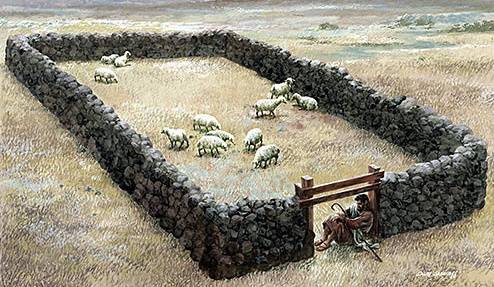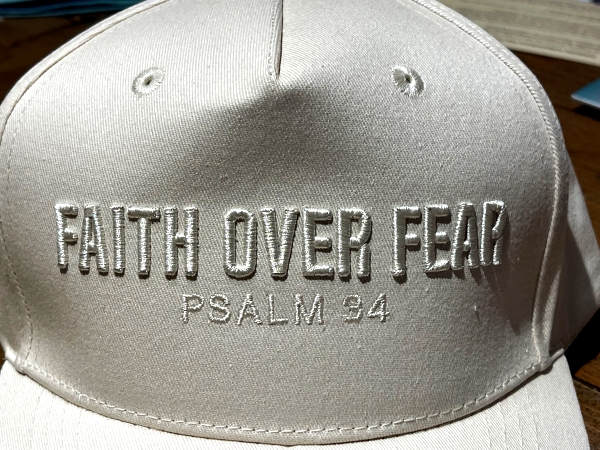You Asked For It: Remove Anxiety
June 15, 2025Pastor Patrick presented today's message, "You Asked For It: Remove Anxiety." A video of today's message is here on YouTube. This series started with folks being asked to submit scriptures that they would like explained/explored. So, it's quite literally: "You asked for it!"
Today's scripture is Philippians 4:4-9.
 In Phil 4:7, Patrick pointed out that the Greek word translated as "guard" (your heart and minds) referenced a guard at a city gate that did not let improper people or things enter the city. This reminded me of an earlier message that included the image/metaphor of a shepherd in the entrance to a sheep pen preventing anything unwanted from getting in. It's always critical to not let bad things in.
In Phil 4:7, Patrick pointed out that the Greek word translated as "guard" (your heart and minds) referenced a guard at a city gate that did not let improper people or things enter the city. This reminded me of an earlier message that included the image/metaphor of a shepherd in the entrance to a sheep pen preventing anything unwanted from getting in. It's always critical to not let bad things in.In both testaments, the words "heart" and "mind" are used almost interchangeably. In the Old Testament (OT) for sure, having been written for the Ancient Near East (ANE), the heart was considered the seat of thinking. We know today that's the brain. The key takeaway is that whether the word used in the Bible is heart or mind, it means essentially the same thing - what we know today as "the brain" (all the heart does is pump blood). The mind is the seat of everything from rational thought to facts to vocabulary to feelings and emotions to ideas to planning to...everything. It would have been easy for the ANE folks to see that the heart pumps blood throughout the body using an entire "plumbing" system. The brain, on the other hand, was just a jumbled mass of stuff which would make little sense without an understanding of electrical impulses, nerve function, molecular biology and chemistry, cells, and the like.
I also appreciated the mention of the word "guard" or "rule" in Phil 4:7 carrying the same notion as a referee. The Peace of God can be your referee. And unlike referees that can make mistakes with tough calls, God's calls would be perfect. If only we listened.
Proverbs 3:5-6, "Trust in the Lord with all your heart and lean not on your own understanding; in all your ways submit to him, and he will make your paths straight." Let him be your referee.
"Guard," in the OT, carries a similar connotation. It can mean to "provide cover" for both good and bad things. It can be protect, maintain, keep and obey; or it can mean conceal or hide. Here are two examples of positive guarding:
Exodus 34:7, "maintaining love to thousands, and forgiving wickedness..."
Deuteronomy 33:9, "...but he watched over your word and guarded your covenant."
Lastly, I'd like to look at the word "anxious" as in Phil 4:6, "do not be anxious about anything, but in everything by prayer and supplication with thanksgiving let your requests be made known to God." The Greek word is mer-im-NAH-oh (μεριμνάω). While it does carry the familiar sense of worrying about something, it also carries a sense of dividing or creating distractions. In that sense, anxiety leads to confusion. It can also refer to being pulled apart or torn to pieces - which also can describe the state of being anxious. Now the Peace of God can be seen to include wholeness or completeness (shalom, שָׁל֑וֹם), pulling an anxious person back together. Shalom peace is much more than lack of fighting or conflict. It's more like all the "peaces" of life's puzzle are in the right place. Things are "picture perfect" from God's point of view. That's the peace of God.
Bonus
Compassion vs Justice
I have often wondered when one applies compassion and when one looks for justice. Well-meaning people can debate this ad nauseum. The clearest distinction I've come across is from Dennis Prager (though I can't for the life of me find exactly where I read it or heard it). Compassion is for the individual to render and justice is for the society to render.
The musical "Les Miserables" tells the story of a man convicted of stealing a loaf of bread for a starving niece or nephew. Let's start with the fact that his punishment was way over the top (that was the real problem, as he was, in fact, guilty of stealing). In a society driven by Biblical principles, he would be found guilty by society's justice system, because that's the truth, given an appropriate punishment or fine, and, most importantly, be helped to recover from all this and the underlying problem (starving family) by his compassionate friends, family, and/or neighbors.
Biblical justice requires that you don't lie. It requires that the system treats everyone fairly, without regard to your status in society, where you came from, etc. It requires that you be accurate (in the sense of weights and measures). Biblical justice indicates that collective guilt exists (e.g. all who supported Hitler where guilty to some degree, too). Proper justice is "a joy to the righteous but terror to evildoers" (Proverbs 21:15).
"Justice, justice, you shall follow” (Deuteronomy 16:20). A word repeated in Biblical Hebrew indicates overwhelming significance.
This Bonus could have been called "Social Justice vs Justice." As soon as you modify the word justice, it's no longer justice. This is explained well in PragerU's 5-minute video: Social Justice Isn't Justice.
When you start hunting for excuses for the commission of a crime, you're in real trouble, Biblically speaking.
Bonus2
Faith Over Fear (Psalm 34)
 Psalm 34 is a Psalm by David that happens to be an acrostic poem. That means that each line begins with the next letter in the Hebrew alphabet starting with the first, aleph, and ending with the last, tau. Technically, this Psalm isn't 100% acrostic, but close enough. Poems were probably written like this to help with memorization.
Psalm 34 is a Psalm by David that happens to be an acrostic poem. That means that each line begins with the next letter in the Hebrew alphabet starting with the first, aleph, and ending with the last, tau. Technically, this Psalm isn't 100% acrostic, but close enough. Poems were probably written like this to help with memorization.The word "faith" does not actually appear in translations, but fear certainly does. The poem makes it clear that trust and praise in the Lord creates an environment where one can shun fear of other outside forces.
The Psalm is a call to praise while enumerating the reasons to praise God. Right off the bat in verse 4, removal of fear is mentioned: "I sought the LORD, and he heard me, and delivered me from all my fears."
Psalm 34:8, "O taste and see that the LORD is good: blessed is the man that trusteth in him." The use of the word taste is interesting. It's one thing to say an apple is good for you, but it's quite another to actually taste, i.e. experience, the goodness.
Later in the Psalm, David makes it clear that there are two camps of people: the righteous and the wicked. He also makes it clear that God wants righteousness from us and abhors the wicked.
This Bonus could also have been titled "Can I Say Godfearing Anymore?" See this 2023 Bonus on Godfearing.
Here's another take on faith. It's a 5-minute PragerU video by Peter Kreeft: The Benefits of Belief. From the listing: "Even if you don't believe in God, do you wish you did? Even if you're an atheist or an agnostic, is there still good reason to act religiously? Peter Kreeft, philosophy professor at Boston College, explains why even atheists should want there to be a God, and how acting as if there is one may actually lead to you believing it."
In a way, fear is about expectations, expected consequences. From whom do you expect the greatest or most consequential outcome(s)?